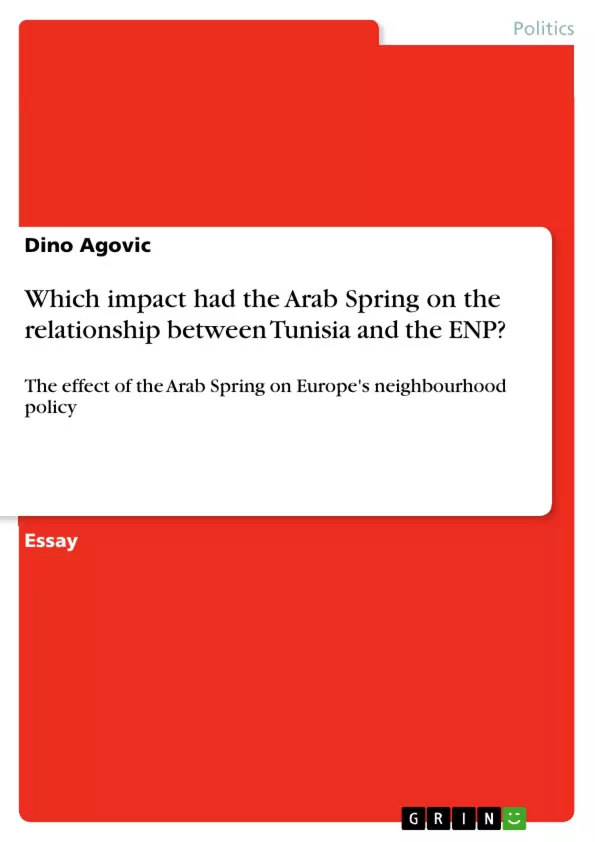The Arab Revolution or the Arab Spring were protests in the Middle East which had their origins in the 17th December 2010 in Tunisia. They were the major revolutions against imperial governments in Arabic nations that started in Tunisia and spread to Egypt amongst other Arabic countries.
During this time, citizens staged several public demonstrations against their government calling for liberation, change of governance, freedom amongst other issues that directly and indirectly affected them. The population turned against the ruling regime in Tunisia. The sharing of pictures and videos during the protests in media and social media (such as Twitter or Facebook) had the effect that the protests spread like wildfire to the neighboring countries. Besides Tunisia, other main actors were Egypt, Algeria, Libya, Jordan, Yemen, Iraq, Morocco, Saudi Arabia and Syria.
Inhaltsverzeichnis (Table of Contents)
- Introduction
- The Impact of Arab Spring
- Policy Suggestions
- Conclusion
Zielsetzung und Themenschwerpunkte (Objectives and Key Themes)
This paper examines the effects of the Arab Spring on the relationship between Tunisia and the European Neighbourhood Policy (ENP). It aims to analyze the impacts of the revolution on this relationship, compare successful and unsuccessful strategies, and provide policy suggestions for restoring and strengthening the connection between Tunisia and the ENP.
- The impact of the Arab Spring on Tunisia's relationship with the ENP.
- The evolution of the ENP in response to the Arab Spring.
- The role of democracy and rule of law in the ENP's approach to Tunisia.
- The economic and social consequences of the Arab Spring on Tunisia.
- Policy recommendations for improving the relationship between Tunisia and the ENP.
Zusammenfassung der Kapitel (Chapter Summaries)
- Introduction: This chapter provides context for the study by outlining the events of the Arab Spring and its origins in Tunisia. It highlights the key factors that led to the protests, including poor living conditions and high unemployment. The chapter also introduces the focus of the paper, which is to analyze the impact of the Arab Spring on the relationship between Tunisia and the ENP.
- The Impact of Arab Spring: This chapter analyzes the immediate impacts of the Arab Spring on the relationship between Tunisia and the European Neighbourhood Policy (ENP). It discusses the creation of a new ENP document, the shift towards differentiation in relations with Arab nations, and the "less for less, more for more" approach. The chapter explores the implications of this new policy on trade, mobility, and development projects between Tunisia and the ENP.
Schlüsselwörter (Keywords)
The main keywords and focus topics of this text include: Arab Spring, Tunisia, European Neighbourhood Policy (ENP), democracy, rule of law, economic development, political reform, foreign policy, and international relations.
Frequently Asked Questions
Where did the Arab Spring originate?
The Arab Spring protests had their origins in Tunisia on December 17, 2010, before spreading to other nations like Egypt, Libya, and Syria.
How did the Arab Spring impact the relationship between Tunisia and the ENP?
The revolution led to a significant shift in the European Neighbourhood Policy (ENP), resulting in a new policy document and a move toward "differentiation" in relations with Arab nations.
What is the "more for more, less for less" approach in the ENP?
It is a policy principle where the EU provides more support to partners that make greater progress toward democratic reform and less to those that do not.
What role did social media play in the Arab Spring?
Social media platforms like Twitter and Facebook were crucial for sharing pictures and videos of protests, allowing the movement to spread rapidly to neighboring countries.
What are the key themes of this analysis regarding Tunisia?
The analysis focuses on political reform, the rule of law, economic development, and policy recommendations to strengthen the connection between Tunisia and the European Union.
- Quote paper
- Dino Agovic (Author), 2016, Which impact had the Arab Spring on the relationship between Tunisia and the ENP?, Munich, GRIN Verlag, https://www.grin.com/document/316967



